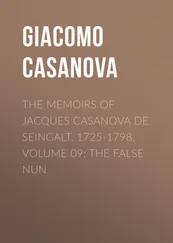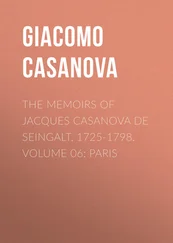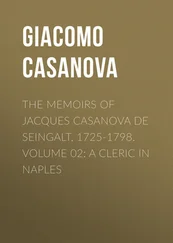The day after my arrival in Fontainebleau I went alone to the court, and I saw Louis XV., the handsome king, go to the chapel with the royal family and all the ladies of the court, who surprised me by their ugliness as much as the ladies of the court of Turin had astonished me by their beauty. Yet in the midst of so many ugly ones I found out a regular beauty. I enquired who she was.
"She is," answered one of my neighbours, "Madame de Brionne, more remarkable by her virtue even than by her beauty. Not only is there no scandalous story told about her, but she has never given any opportunity to scandal-mongers of inventing any adventure of which she was the heroine."
"Perhaps her adventures are not known."
"Ah, monsieur! at the court everything is known."
I went about alone, sauntering through the apartments, when suddenly I met a dozen ugly ladies who seemed to be running rather than walking; they were standing so badly upon their legs that they appeared as if they would fall forward on their faces. Some gentleman happened to be near me, curiosity impelled me to enquire where they were coming from, and where they were going in such haste.
"They are coming from the apartment of the queen who is going to dine, and the reason why they walk so badly is that their shoes have heels six inches high, which compel them to walk on their toes and with bent knees in order to avoid falling on their faces."
"But why do they not wear lower heels?"
"It is the fashion."
"What a stupid fashion!"
I took a gallery at random, and saw the king passing along, leaning with one arm on the shoulder of M. d'Argenson. "Oh, base servility!" I thought to myself. "How can a man make up his mind thus to bear the yoke, and how can a man believe himself so much above all others as to take such unwarrantable liberties!"
Louis XV. had the most magnificent head it was possible to see, and he carried it with as much grace as majesty. Never did even the most skilful painter succeed in rendering justice to the expression of that beautiful head, when the king turned it on one side to look with kindness at anyone. His beauty and grace compelled love at once. As I saw him, I thought I had found the ideal majesty which I had been so surprised not to find in the king of Sardinia, and I could not entertain a doubt of Madame de Pompadour having been in love with the king when she sued for his royal attention. I was greatly mistaken, perhaps, but such a thought was natural in looking at the countenance of Louis XV.
I reached a splendid room in which I saw several courtiers walking about, and a table large enough for twelve persons, but laid out only for one.
"For whom is this table?"
"For the queen. Her majesty is now coming in."
It was the queen of France, without rouge, and very simply dressed; her head was covered with a large cap; she looked old and devout. When she was near the table, she graciously thanked two nuns who were placing a plate with fresh butter on it. She sat down, and immediately the courtiers formed a semicircle within five yards of the table; I remained near them, imitating their respectful silence.
Her majesty began to eat without looking at anyone, keeping her eyes on her plate. One of the dishes being to her taste, she desired to be helped to it a second time, and she then cast her eyes round the circle of courtiers, probably in order to see if among them there was anyone to whom she owed an account of her daintiness. She found that person, I suppose, for she said,
"Monsieur de Lowendal!"
At that name, a fine-looking man came forward with respectful inclination, and said,
"Your majesty?"
"I believe this is a fricassee of chickens."
"I am of the same opinion, madam."
After this answer, given in the most serious tone, the queen continued eating, and the marshal retreated backward to his original place. The queen finished her dinner without uttering a single word, and retired to her apartments the same way as she had come. I thought that if such was the way the queen of France took all her meals, I would not sue for the honour of being her guest.
I was delighted to have seen the famous captain who had conquered Bergen-op-Zoom, but I regretted that such a man should be compelled to give an answer about a fricassee of chickens in the serious tone of a judge pronouncing a sentence of death.
I made good use of this anecdote at the excellent dinner Silvia gave to the elite of polite and agreeable society.
A few days afterwards, as I was forming a line with a crowd of courtiers to enjoy the ever new pleasure of seeing the king go to mass, a pleasure to which must be added the advantage of looking at the naked and entirely exposed arms and bosoms of Mesdames de France, his daughters, I suddenly perceived the Cavamacchia, whom I had left in Cesena under the name of Madame Querini. If I was astonished to see her, she was as much so in meeting me in such a place. The Marquis of Saint Simon, premier 'gentilhomme' of the Prince de Conde, escorted her.
"Madame Querini in Fontainebleau?"
"You here? It reminds me of Queen Elizabeth saying,
"'Pauper ubique facet.'"
"An excellent comparison, madam."
"I am only joking, my dear friend; I am here to see the king, who does not know me; but to-morrow the ambassador will present me to his majesty."
She placed herself in the line within a yard or two from me, beside the door by which the king was to come. His majesty entered the gallery with M. de Richelieu, and looked at the so-called Madame Querini. But she very likely did not take his fancy, for, continuing to walk on, he addressed to the marshal these remarkable words, which Juliette must have overheard,
"We have handsomer women here."
In the afternoon I called upon the Venetian ambassador. I found him in numerous company, with Madame Querini sitting on his right. She addressed me in the most flattering and friendly manner; it was extraordinary conduct on the part of a giddy woman who had no cause to like me, for she was aware that I knew her thoroughly, and that I had mastered her vanity; but as I understood her manoeuvring I made up my mind not to disoblige her, and even to render her all the good offices I could; it was a noble revenge.
As she was speaking of M. Querini, the ambassador congratulated her upon her marriage with him, saying that he was glad M. Querini had rendered justice to her merit, and adding,
"I was not aware of your marriage."
"Yet it took place more than two years since," said Juliette.
"I know it for a fact," I said, in my turn; "for, two years ago, the lady was introduced as Madame Querini and with the title of excellency by General Spada to all the nobility in Cesena, where I was at that time."
"I have no doubt of it," answered the ambassador, fixing his eyes upon me, "for Querini has himself written to me on the subject."
A few minutes afterwards, as I was preparing to take my leave, the ambassador, under pretense of some letters the contents of which he wished to communicate to me, invited me to come into his private room, and he asked me what people generally thought of the marriage in Venice.
"Nobody knows it, and it is even rumoured that the heir of the house of Querini is on the point of marrying a daughter of the Grimani family; but I shall certainly send the news to Venice."
"What news?"
"That Juliette is truly Madame Querini, since your excellency will present her as such to Louis XV."
"Who told you so?"
"She did."
"Perhaps she has altered her mind."
I repeated to the ambassador the words which the king had said to M. de Richelieu after looking at Juliette.
"Then I can guess," remarked the ambassador, "why Juliette does not wish to be presented to the king."
I was informed some time afterwards that M. de Saint Quentin, the king's confidential minister, had called after mass on the handsome Venetian, and had told her that the king of France had most certainly very bad taste, because he had not thought her beauty superior to that of several ladies of his court. Juliette left Fontainebleau the next morning.
Читать дальше












